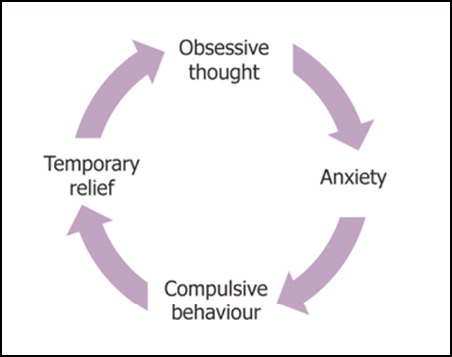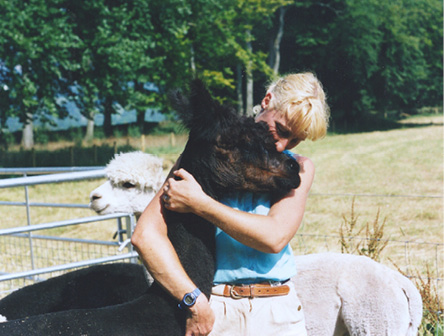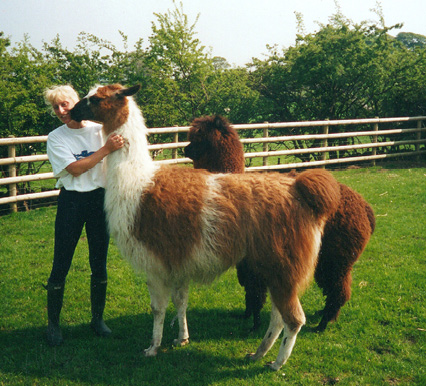Fight For Your Dream (9 page)
Read Fight For Your Dream Online
Authors: Elaine Hazel Sharp
Tags: #Alpaca, #Cancer, #Farming, #business, #biography, #horses, #lima, #prize

Black Hole
Misery, sheer hell: that's what comes to mind when I think of that time. Days slipped into weeks, and the weeks turned into months. No change: I was living in my own prison and no one could reach me, not even Nigel. I felt like I had reached the point of no return. Is this the way I would exist? If it was then I didn't want to. I wanted peace. Endless sleep - surely - would find me endless peace.
I've heard some people comment on committing suicide, and what their opinions on it are.
Some people are sympathetic and try to understand what a bad place one must be in to contemplate doing such a thing. Yet I've heard some people say its selfish, and a coward's way out. To be honest, I struggle to see how some people can think the latter.
From my experience, it's not a question of making a considered decision; that doesn't even come into the equation. I found myself struggling to string a sentence together. In my opinion, one is not of sane mind when in such a bad place. I know this sounds so dramatic, and I do not mean to infer that physical illness is inferior to mental illness, but every part of my being felt numb and blank. I didn't want to talk to anyone, or even see any members of my family. If the phone rang I would sob uncontrollably, and Nigel would need to hold me and tell me it would be okay. I didn't want to get out of bed in the mornings. Nigel had to literally drag me out of bed and physically stand me in the shower to wash me; otherwise I wouldn't have bothered. He would switch the shower on and empty shampoo onto my hair, lift my hand and show me how to rub my head to wash my hair. Next he would soap the sponge to bathe me, lift up my arms to wash my armpits and then work his way downwards, until finally finishing with my feet. I was just a dummy who was moved from one place to the next. My world was virtually non existent. I know now, without a shadow of a doubt, that if I hadn't had the love and support of Nigel and my family, I would definitely not be here today. I'm not proud of that fact, but neither am I ashamed.
Although our twice weekly visit to see my psychologist did seem to help, progress was extremely slow, and it was rare for me to go from one visit to the next without making a couple of phone calls to Louise for help. It was at one of the weekly visits that Louise was very open and honest with Nigel and myself and, although I didn't fully understand what this would mean, I was in no position to question her decision. âActually, Nigel, I think I need to put my cards on the table, and tell you that I think I've gone as far as I possibly can with Elaine now. I believe that further treatment will be necessary if Elaine is ever to be fully well, and I'm afraid it would not be ethical for me to continue treating Elaine under these circumstances'.
The following week, an appointment had been made for us to see a consultant psychiatrist at Sheffield's Claremont Hospital.
It was 4.50pm on a Saturday afternoon, in the spring of 1998. We were shown into a private room, where a short man with a beard sat behind a desk. As we approached he stood up and held out his hand. Nigel shook his hand and thanked him for seeing us at such short notice, then introduced me. He turned to look at me, again held out his hand and said, âHello, Elaine, please take a seat.' I sat on a grey upholstered chair on Nigel's right-hand side, and I wore the same black blazer and grey slacks which I had worn when we visited Mr Shorthouse only a few months earlier.
The exact sequence of events which then took place is not all that clear in my mind, which is strange because for most occasions I can recall memories word for word. Now, whether that is because it was, and still is, very painful to think about, I'm not sure. Perhaps it is my mind's way of blocking out so many years of living with, and trying to deal with, such a debilitating mental illness, which I had never even heard of, let alone understand until our meeting with Dr Macaskill that spring day.
OCD
(Obsessive-Compulsive Disorder)
Obsessive-Compulsive Disorder shows itself in many different forms.
OCD is an anxiety disorder characterised by intrusive thoughts that produce uneasiness, apprehension, fear or worry, by repetitive behaviours aimed at reducing the associated anxiety, or by a combination of such obsessions and compulsions. Symptoms of the disorder can include excessive washing or cleaning, repeated checking, extreme hoarding, or preoccupation with sexual, violent or religious thoughts. Some people with OCD also develop depression and severe depression, and may sometimes have suicidal thoughts and feelings.
The diagram below shows how obsessions and compulsions are connected in an OCD cycle.

If you experience OCD, your obsessions and compulsions will cause you considerable fear and distress. They will also take up a significant amount of time, and disrupt your ability to carry on with your day-to-day to life, including doing daily chores, going to work, or maintaining relationships with friends and family.
Many people with OCD experience feelings of shame and
loneliness
. This often stops them from seeking help, particularly if they experience distressing thoughts about subjects such as religion, sex or violence.
This means that many people try to cope with OCD alone, until the symptoms are so severe that they can't hide them any more. OCD is also known to have a close association with depression, and some people find obsessions appear, or become worse, when they are depressed.
Some psychology theories suggest that OCD is caused by personal experience. It is thought that if you have had a painful childhood experience, or suffered trauma or
abuse
, you might learn to use obsessions and compulsions to cope with
anxiety
. However, this theory does not explain why people who cannot point to any painful experiences might experience OCD.
Many people who know me will probably be surprised to discover that I have OCD. Over the early years (from the age of 13) I was able to hide it from the outside world. Even my family wasn't aware. To be honest, even I wasn't aware. It was my secret that that I had to hide. Over the years my OCD worsened. I felt so alone, frightened, ashamed and disgusted about what I had in my head. I've been told by experts that it was the diagnosis of cancer that was the catalyst for it all finally coming to a head. It's been horrendous and it's something that I have had to learn to deal with and live with on a daily basis. With the love and support of Nigel, family, friends and, of course, my animals, we get through it. Over the years of treatment, the good days now out-weigh the bad days, but I am never so naïve as to think that I'm cured. I will always live in a certain amount of fear of it returning, as it has done on so many occasions. In fact, I'll probably take that fear to my grave. I know it sounds ridiculous for most people to accept, but I feel that, if it hadn't been for the diagnosis of cancer, the OCD may not have been forced to the surface, and I may still be living in a very different world of my own. I have cancer to thank for facing OCD, and finally getting the treatment I so desperately needed. However, for anyone out there who is suffering, you really don't need to suffer alone. Help is out there. Believe me, it took twenty-one years for me to finally seek help. Please, don't waste even one year, let alone twenty-one years!
Fighting Back

George and I sharing a tender moment
It's not been easy. It still isn't easy and in fact it's been the hardest challenge I've ever had to face; much harder than fighting the cancer. Even today I still have âblips'. However, the key to coping and dealing with OCD is recognising the trigger, which in itself can be difficult. If the thoughts and pictures are really severe and intrusive, then it can be too debilitating to even recognise the signs. Nigel is fantastic with me though, and always gives me his undivided attention to talk it through.
The mind is incredible, but it can also be very dangerous and frightening. I have so much empathy with anyone who may be trying to deal with this horrible illness. I would not wish this on my worst enemy. My main aim for writing this book is because, if I can help just one person who may be trying to deal with this illness, then it will have been worth it. As you already now know, the illness manifested itself many years ago, although we didn't know it was an illness until we were introduced to Dr Mackaskill.
I suppose after that I did take some comfort in the knowledge that I was suffering from a recognised and documented illness. Living with OCD can be a very difficult subject to talk about. It can be embarrassing, distressing and completely take over your life at times. I know, because I live with it twenty-four seven, three hundred and sixty-five days a year. No two individuals' circumstances are the same, and I know that I've been blessed with an incredible husband and family. Without them my situation could have been far worse, and I feel tremendously saddened for people less fortunate than me, who are dealing with this awful illness alone.
Living with mental illness can be a very lonely life, because to everyone else it's not visible, it's difficult to understand, and the subject matter can be difficult to talk about for the patient and their loved ones. The one thing I can tell you, is that there are people who can and will help you. Together with the help of a psychiatrist, medication and cognitive therapy, there will be some light at the end of your dark tunnel, but it will take some time. It's not an easy road to travel. It's tough and it's very tiring at times but, unless you take the first steps, you'll never find out.
Turning Point
From the age of four years old I have always had a fascination with Llamas. This all started with our annual family holiday in Blackpool. Over the week that we spent there, every year, I always looked forward to our trip to the famous Blackpool Pleasure Beach. For any of you who don't know what the Pleasure Beach consists of, I'll explain. It's a huge area of amusement rides that stretches over several miles. Children and adults alike love the thrill of the daring roller coaster ride, known as the âBig Dipper', as well as the âGrand National', where two carriages appear to challenge each other to the race. The âLog flume' was another great ride. Sitting in what appeared to be a log (plastic actually), and racing around a water-filled flowing canal, gave me hours of pure pleasure. The âBig Horses' was another ride. I suppose it could be described as Lancashire's answer to Disney World. Candy floss came in abundance, along with hot dogs, doughnuts and kiss-me-quick hats. I loved it.
One particular year I spotted an unusual looking animal, quite big and furry, with banana-shaped ears and a pointy face. Little did I know it then, but it was a Llama. I can remember tugging at dad's hand to take me over for a closer look; it was magical. Its long, dark eyelashes were beautiful, yet it stood so regally and proud. That was it. I was smitten. Llama rides were being offered to small children, as well as pony rides, but it was the llama that I wanted. It was smartly groomed in all its traditional dress, and I will never forget the excitement I felt when dad sat me on that saddle. To this day, that initial picture and excitement I felt on that special occasion has stayed with me.
By now it was late March 1999 and, although I was still in the relatively early stages of my recovery, I felt I was in need of a focus. Unfortunately, in February I had found a further breast lump, which needed to be removed asap. Because of my mental state, it was deemed that the chemotherapy should be delayed for one month. It was a Sunday afternoon and, as usual, Nigel and I were relaxing in our lounge together. For some strange reason I picked up Nigel's âFarming Magazine', which is something I never did, and started to flick through the ads. I'm still not sure what must have been going through my mind, but one of the ads, in bold black letters, stated, âLlamas for sale'. It was almost as if a switch had been turned on.
âNigel, Nigel,' I said, as I got to my feet. âThat's it. I've got it'.
âGot what?' he asked.
âLlama, llama, that's what I want. That's what I need'.
Nigel stared back at me in amazement, trying to determine if I had said what he thought he had heard me say.
âLook, love, hang on a minute. Just think this through. You can't just go and buy a llama'.
âWhy not?' I replied. âThere's some for sale. Look at this,' I said, as I walked over and pushed the magazine into his hand.
âLove, you've got to start chemo soon. That's not going to be easy, so we certainly don't need to start adding a llama to our commitments'.
âBut don't you see, bun, this could be just what I need. A focus, an animal that needs me to care for it, a distraction from the treatment. It could be the making of me'.
âIt might also be a disaster,' he sighed, knowing that he'd already lost the battle. At this time in our life, Nigel would have given me anything, anything to see me smile again and make me happy. Nigel has said since, that he had no idea what the following months and years might bring. Would the cancer return? Would he still have his wife in five years time? All questions he just couldn't answer, and for that reason he would have given me anything I wanted, no matter how bizarre! And so the seed was sown. All I had to do now was to do some research and make a few phone calls.

Extraordinary bond between human and Llama. Marty and me. Summer 1998